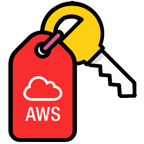Awskeyring is a small tool to manage AWS account keys in the macOS Keychain. It has grown to incorporate a lot of features.
Awskeyring is a fairly mature project so it it doesn't see frequent updates but is still being maintained. It is tested against the version of Ruby that is shipped with the latest version of macOS, but that ruby version is dated.
The motivation of this application is to provide a local secure store of AWS credentials using specifically in the macOS Keychain, to have them easily accessed from the Terminal, and to provide useful functions like assuming roles and opening the AWS Console from the cli. For Enterprise environments there are better suited tools to use like HashiCorp Vault.
Install it with:
$ gem install awskeyring --user-install
or via homebrew gem:
$ brew gem install awskeyring
Please see the Wiki for full usage instructions and tips.
First you need to initialise your keychain to hold your AWS credentials.
$ awskeyring initialise
Then add your keys to it.
$ awskeyring add personal-aws
Now your keys are stored safely in the macOS keychain. To print environment variables run...
$ awskeyring env personal-aws
Alternatively you can create a profile using the credential_process config variable. See the AWS CLI Config docs for more details on this config option.
[profile personal]
region = us-west-1
credential_process = /usr/local/bin/awskeyring json personal-aws
The CLI is using Thor with help provided interactively.
Awskeyring commands:
awskeyring --version, -v # Prints the version
awskeyring add ACCOUNT # Adds an ACCOUNT to the keyring
awskeyring add-role ROLE # Adds a ROLE to the keyring
awskeyring console ACCOUNT # Open the AWS Console for the ACCOUNT
awskeyring env ACCOUNT # Outputs bourne shell environment exports for an ACCOUNT
awskeyring exec ACCOUNT command... # Execute a COMMAND with the environment set for an ACCOUNT
awskeyring help [COMMAND] # Describe available commands or one specific command
awskeyring import ACCOUNT # Import an ACCOUNT to the keyring from ~/.aws/credentials
awskeyring initialise # Initialises a new KEYCHAIN
awskeyring json ACCOUNT # Outputs AWS CLI compatible JSON for an ACCOUNT
awskeyring list # Prints a list of accounts in the keyring
awskeyring list-role # Prints a list of roles in the keyring
awskeyring remove ACCOUNT # Removes an ACCOUNT from the keyring
awskeyring remove-role ROLE # Removes a ROLE from the keyring
awskeyring remove-token ACCOUNT # Removes a token for ACCOUNT from the keyring
awskeyring rotate ACCOUNT # Rotate access keys for an ACCOUNT
awskeyring token ACCOUNT [ROLE] [CODE] # Create an STS Token from a ROLE or an mfa CODE
awskeyring update ACCOUNT # Updates an ACCOUNT in the keyring
and autocomplete that can be installed with:
$ complete -C /usr/local/bin/awskeyring awskeyring
There are also short forms of most commands if you prefer:
$ awskeyring ls
To set your environment easily the following bash function helps:
awsenv() { eval "$(awskeyring env ${@:-$AWS_ACCOUNT_NAME})"; }
After checking out the repo, run bundle update to install dependencies. Then, run bundle exec rake to run the
tests. Run bundle exec awskeyring to use the gem in this directory, ignoring other installed copies of this gem.
Awskeyring is tested against the last two versions of Ruby shipped with macOS.
To install this gem onto your local machine, run bundle exec rake install.
If you believe you have found a security issue in Awskeyring, please responsibly disclose by contacting me at tristan.morgan@gmail.com. Awskeyring is a Ruby script and as such Ruby is whitelisted to access your "awskeyring" keychain. Use a strong password and keep the unlock time short.
Bug reports and pull requests are welcome on GitHub at https://github.com/tristanmorgan/awskeyring. This project is intended to be a safe, welcoming space for collaboration, and contributors are expected to adhere to the Contributor Covenant code of conduct.
- Tristan tristanmorgan
- Adam Sir AzySir
- Vito Giarrusso thtliife
The gem is available as open source under the terms of the MIT License.





